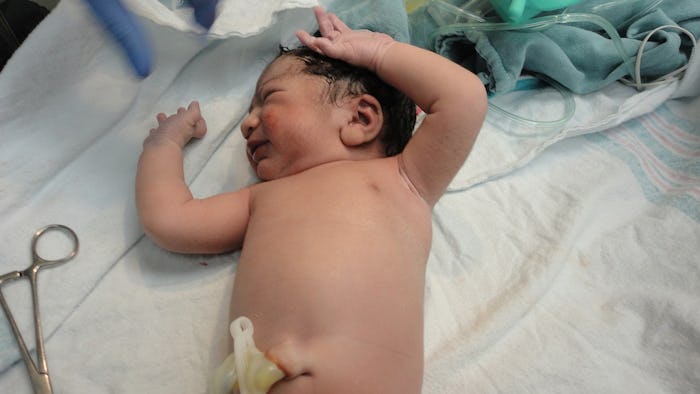It's mind-blowing to consider that the small amount of baby cord blood left behind after birth could potentially save a life. Knowing there's an option to do good, further research, and help someone else by simply saving your baby cord blood may have you wondering should you save your cord blood and what its effect could be for someone else. In order to make the best choice for you, find out what it means and the impact it can have.
Before you save your baby's cord blood, you should know what it is. According to Parents, cord blood is the blood in the umbilical cord and placenta. It's rich in stem cells that can morph into all kinds of other blood cells, which makes them essential for treating diseases that may harm the blood or immune system. Cord blood could result in treatments or cures for illnesses like leukemia, cancer, and more, according to the aforementioned Parents article.
According to March of Dimes, collecting cord blood has zero risk on you or your baby. The site stated there are two ways to save cord blood. One is to donate it to a public cord blood bank at no cost, so it can be used for research or to help other people. The other option is to store the blood in a private cord blood bank, which would allow you to use it if a family member needed it or if there's a health condition that has to be treated with a stem cell transplant. A private cord blood bank is, on average, around $2,000 and maintains a yearly fee. Additionally, the chance that you or family would use the blood is about one in 2,700, according to the aforementioned March of Dimes article.
Luckily, saving your cord blood isn't a difficult process. During your pregnancy, you have a couple options. According to Be the Match, the first is to visit Be the Match or contact your hospital to make sure they work with a public cord blood bank. Then, you'l want to contact the associated blood bank between week 28 and 34 of your pregnancy. Afterward, let your OB-GYN know and mention it to your nurses when you go in for delivery. If your hospital doesn't work with a public cord blood bank or you want to go the private route, your next option is to reach out to a cord blood registry to get a collection kit, according to Cord Blood Registry. Then, let your OB-GYN know and bring the kit with you when you give birth. Call the number listed on the kit for a medical courier after the blood's been collected, and they will pick it up for transport.
Ultimately, the decision to save baby's cord blood is yours and yours alone. That being said, there's really no reason not to do it. Keep in mind, the only potential downside associated with cord blood banking is going the private route and paying the initial fee for cord blood you might not use. If your still on the fence, there's no harm in reaching out to your doctor or hospital for more information.
